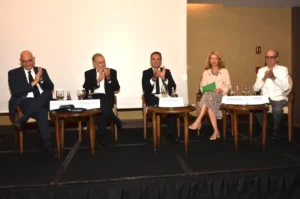EUROCLIMA is the European Union’s flagship program to contribute to environmental sustainability and the fight against climate change.
The Government of the Dominican Republic, the European Union Delegation in the country and the EUROCLIMA Program have presented today the actions that mark the beginning of a strategic alliance to contribute to environmental sustainability and the fight against climate change.
This is the incorporation of the Dominican Republic to the EUROCLIMA program, which will provide support to different Dominican institutions and organizations to accompany actions in the areas of disaster management and electric mobility.
This integration articulates the Ministries of Economy and Environment, and the National Council for Climate Change and Clean Development Mechanism.
“In my role before the Forum of Ministers of the Central American Commission on Environment and Development (CCAD) in the framework of the Central American Integration System (SICA), which I will host this week, I congratulate the request of the technical teams and the Dominican authorities to propose the inclusion of our country to access the benefits of the program. That is why today I would like to thank the European Union for considering the extension of this initiative to us as part of the Caribbean countries from one regional integration body to another”, explained the Dominican Minister of the Environment and Natural Resources, Miguel Ceara Hatton, during his speech at the event.
He emphasized that with the inclusion in EUROCLIMA a precedent is set, and this is a great step towards the transformation of the State, through working in unison, where we complement each other to avoid duplication of efforts and of course strengthen relations between the institutions responsible for combating the adverse effects of climate change.
In this regard, Max Puig, vice-president of the National Council for Climate Change and Clean Development Mechanism, said that they hope to “continue strengthening and deepening cooperation with the European Union with EUROCLIMA”. Puig indicated that the country’s great challenge is the financing of climate action, when referring to mitigation and adaptation needs.
“Adaptation and building an economy and communities that are more resilient to the effects of climate change and reducing greenhouse gas emissions are the great challenges facing humanity at this time. The Dominican Republic must also respond to these challenges if we want to emerge unscathed, stronger and more cohesive”, added Pável Isa Contreras, Minister of Economy, Planning and Development.
Isa Contreras considered that the important thing is the space for discussion offered by the Euroclimate program; he mentioned that resilience must be created in the productive, tourism, macroeconomic and fiscal aspects.
From the EU, the Ambassador in the Dominican Republic, Katja Afheldt, and the Head of Unit for Mexico, Central America, Caribbean and Regional Operations of the EU, Felice Zaccheo, emphasized the strategic nature of this alliance. “The European Union has the ambition to lead by example. Despite the current energy crisis, our commitment to reach zero emissions by 2050 has not changed. Having ambitious climate policies from all major economies and emitters is crucial,” explained Afheldt.
“The Dominican Republic is the pioneer country of the EUROCLIMA Program in the Caribbean region. This environmental partnership will strengthen cooperative ties in the fight against climate change and biodiversity conservation in the region,” added Zaccheo.
Disaster management and electric mobility
During the event, the steps followed for the incorporation of the Caribbean country to EUROCLIMA were detailed and the actions included in the Road Map were analyzed.
On March 31, the beginning of this alliance was signed and, two months later, a first workshop held in Santo Domingo deepened the actions formulated between EUROCLIMA and the Dominican Government. Following the workshop, all the actors involved in the actions worked on the development of the Roadmap that has been presented today in Santo Domingo.
The three actions included in the Roadmap address key issues for the Dominican climate agenda: the strengthening of disaster management in forest emergencies; the increase of electric vehicles in the public sector and the design of a pilot project with 130 electric buses in vehicle fleets of public and private entities.
The Dominican Republic joins the EUROCLIMA program with financing from the European Development Funds (EDF) and the support of the International and Ibero-American Foundation for Public Administration and Public Policy (FIIAPP) as implementing agency. In addition, several Spanish public institutions will support the development of the actions: the Ministries of the Interior, Ecological Transition and Transport, as well as the Municipal Public Transport Company of Madrid (EMT).
About EUROCLIMA
EUROCLIMA is a program financed by the European Union and co-financed by the German federal government through the Federal Ministry for Economic Cooperation and Development (BMZ), as well as by the governments of France and Spain, through the Ministry of Foreign Affairs, European Union and Cooperation. The Program’s mission is to reduce the impact of climate change and its effects in 18 countries in Latin America and the Caribbean by promoting mitigation, adaptation, resilience and climate investment. For this, it is implemented according to the “Spirit of Team Europe” under the synergistic work of seven agencies: Spanish Agency for International Development Cooperation (AECID); French Development Agency (AFD); Economic Commission for Latin America and the Caribbean (ECLAC); Expertise France (EF); International and Ibero-American Foundation for Administration and Public Policy (FIIAPP); Deutsche Gesellschaft für Internationale Zusammenarbeit (GIZ) GmbH and the UN Environment Program.
About @MinEconomiaRD
The Ministry of Economy, Planning and Development leads and coordinates the process of formulation, management, monitoring and evaluation of macroeconomic and sustainable development policies. In addition, it is the Governing Body of the National Planning and Public Investment System and of the Territorial Planning and Management. Its function is to formulate the Development Strategy and the National Multiannual Public Sector Plan, including the necessary coordination at the municipal, provincial, regional, national and sectoral levels, to guarantee the overall coherence between policies, plans, programs and actions.
Learn More: NEWS

